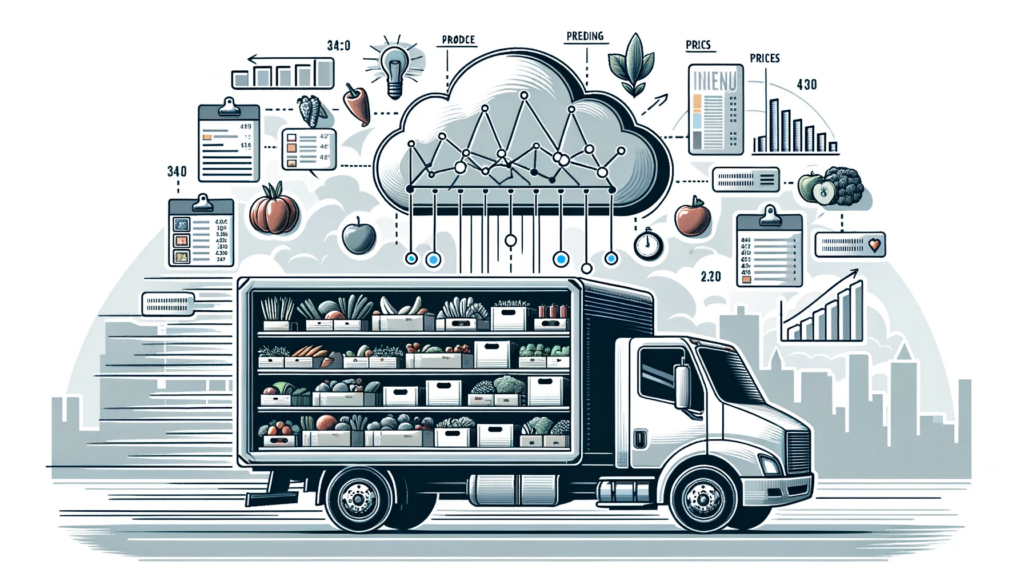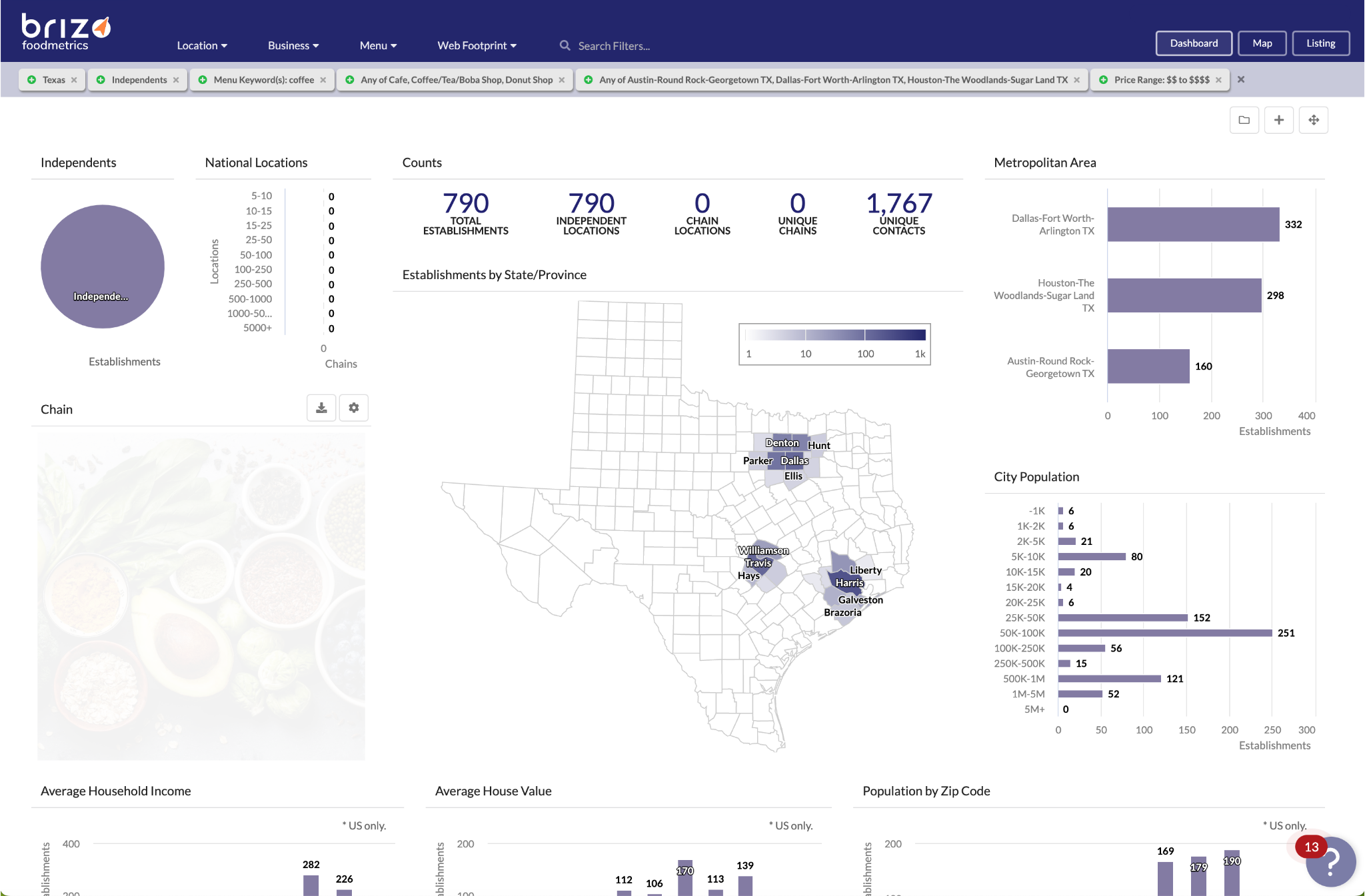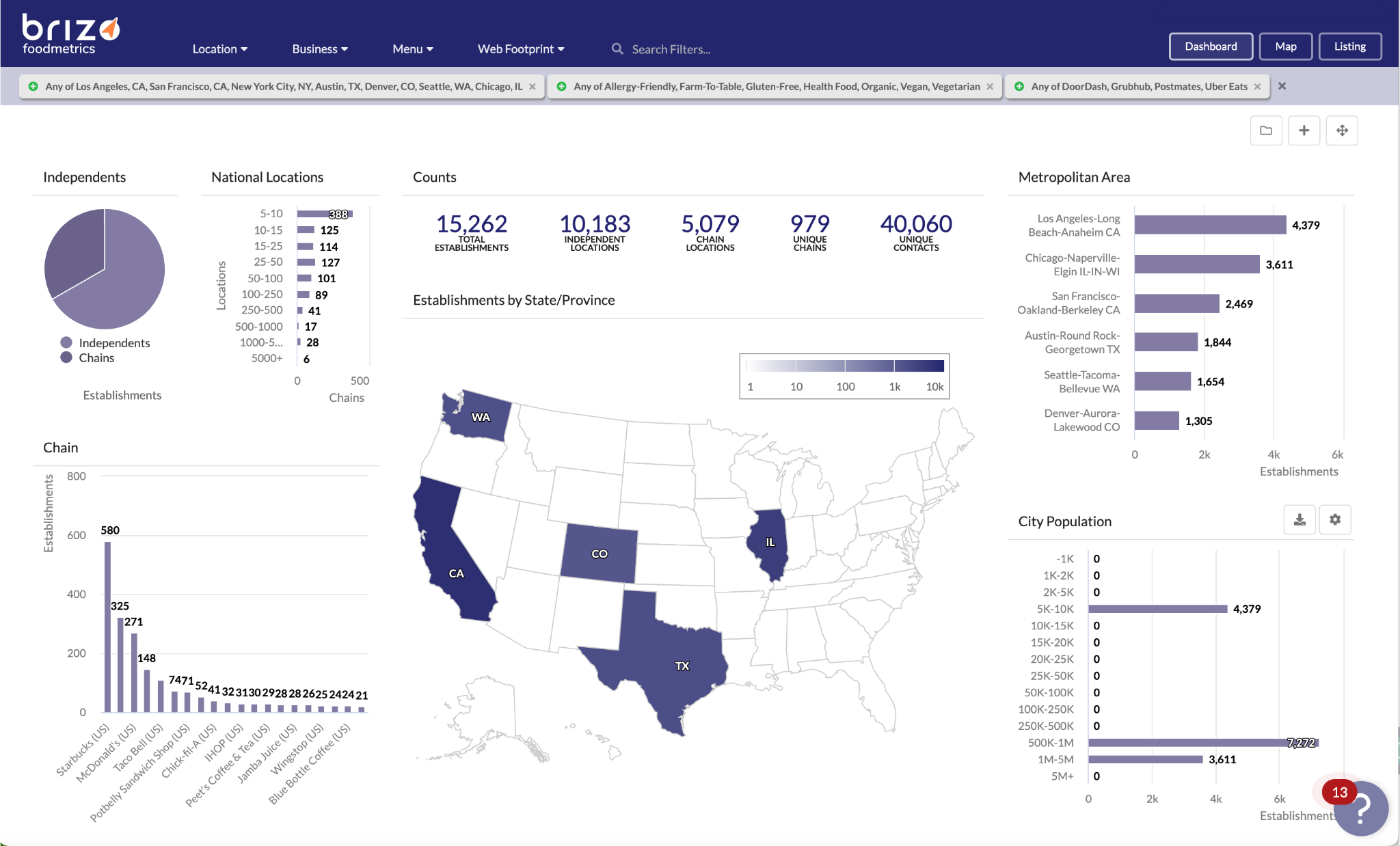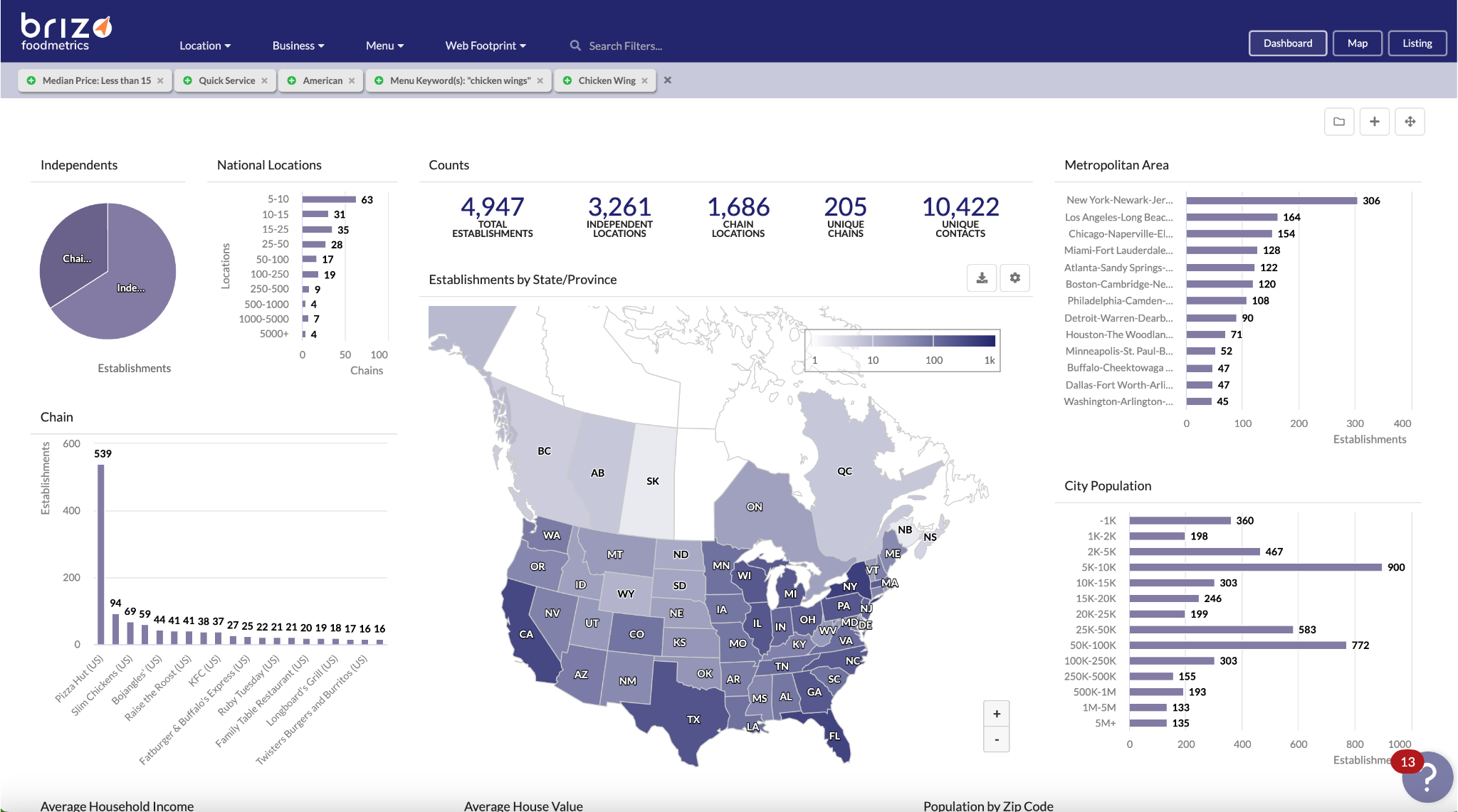
Are you still relying on gut instinct and outdated reports to make your distribution decisions? What if you could unlock a treasure trove of data to guide you to your ideal customers? Welcome to the future of food and beverage distribution powered by market menu data.
The foodservice industry is in flux—staffing shortages, economic uncertainties, and changing consumer preferences are just the tip of the iceberg. In this volatile environment, making data-driven decisions is not just an advantage; it’s a necessity. Here’s where market menu data comes into play, offering insights into what establishments are serving, which can be a strong indicator of market trends, pricing strategies, and a leading indicator for consumer preferences.
With access to over 1.5 million foodservice establishments and 2.5 billion+ menu items observed, Brizo FoodMetrics is your go-to platform for actionable, up-to-date information on the foodservice industry.
Let’s explore how food and beverage distributors could strategically leverage Brizo FoodMetrics to find their ideal customer base through a series of usecase scenarios.
This specialty coffee roaster sources its beans from women-owned farms in Guatemala and Costa Rica. The price point of its bags of coffee is on the higher end. The company is currently only looking to distribute in Texas.
Filters Used: Texas, Cafes, Coffee Shops, Donut Shops, $$ Price Range, Trendy Ambiance

Let’s walk through how this coffee roaster utilized the Brizo FoodMetrics platform to pinpoint its ideal customer base in Texas.
Step 1: Initial Market Size
Starting off, they identify that Texas has approximately 14,250 independent foodservice establishments that serve coffee.
Step 2: Type of Establishments
To refine the search, they focus on cafes, coffee shops, and donut shops, which narrows the list down to nearly 3,300 establishments.
Step 3: Geographical Focus
Believing that urban customers are more willing to pay a premium for quality coffee, the roaster then filters establishments located in major cities—Dallas, Houston, and Austin.
Step 4: Price Range Matching
To ensure a good fit with their high-end product, they apply the “($$) Price Range” filter to find establishments that align with their pricing strategy.
Step 5: Ambiance Factor
To match the vibe of their typical customer, they add a “trendy” tag to the filter.
Final Result:
After applying all these filters, the coffee roaster is left with a highly targeted list of 790 establishments in Dallas, Houston, and Austin that perfectly align with their brand and product offering.
Action:
Armed with this targeted data and access to decision-maker contact information, the coffee roaster can confidently contact these 790 establishments to offer their premium coffee, knowing they are reaching out to highly qualified prospects. Additionally, with the available address information, they can send out sample batches to these establishments through direct mailer campaigns.
A national organic produce distributor is looking to expand into urban markets known for a health-conscious dining scene.
Filters Used: Key Cities, Dietary Styles, Delivery Marketplaces

Here’s how this distributor leveraged the Brizo FoodMetrics platform to target their expansion efforts.
Step 1: Initial Market Size (Key Cities)
The distributor starts by focusing on key urban markets: San Francisco, Los Angeles, Portland, and five other cities. This initial filter reveals a pool of 52,000 potential establishments.
Step 2: Dietary Preferences
To align with their organic and health-conscious products, they apply filters for ‘Organic,’ ‘Vegan,’ and other health-driven options. This refines the list to 22,300 suitable partners.
Step 3: Online Delivery Platforms
Acknowledging the growing importance of online food delivery, they further filter for establishments that are prominently featured on major delivery platforms like UberEats and DoorDash.
Step 4: Chain vs. Independent
The list now stands at 15,000 establishments, broken down into 5,000 chain venues and 10,000 independent venues.
Final Result:
After applying these targeted filters on Brizo FoodMetrics, the distributor is left with a curated list of 15,000 establishments that are highly aligned with their product offerings and market focus.
Action:
Equipped with this refined list and market context, the distributor is now prepared for targeted outreach. Whether connecting with head offices, franchisors, or local managers, they can tailor their offers to meet the specific needs and preferences of each prospect.
A mid-sized vegan meat company aims to introduce its crispy vegan chicken wings across the nation, targeting quick-service venues with a median meal price point of $1-$15.
Filters Used: Business Type, Median Meal Price, Cuisine Type, Menu Keyword

Let’s delve into how this vegan meat company strategically used Brizo FoodMetrics to find their ideal distribution points.
Step 1: Median Price and Business Type
The company starts by setting filters for a median meal price point of “$1-$15” and the “quick service” business type, ensuring alignment with their product’s pricing and target venues.
Step 2: Cuisine Focus
They then narrow their focus to the “American” cuisine category, as chicken wings are a staple in American dining. This helps them avoid reaching out to establishments where chicken wings would be out of place, like Italian or Japanese joints.
Step 3: Existing Offerings
The primary focus of their outreach is establishments already offering chicken wings, giving them an opportunity to introduce a vegan alternative.
Step 4: Ingredient-Level Filtering
For a more refined approach, they employ Brizo’s AI-driven ingredient filter, selecting “Chicken Wing” dishes. This further narrows down their list.
Final Result
After applying these filters, the company is left with a targeted list of 4,900 establishments, opening doors to over 10,000 potential contacts who are highly likely to be interested in their vegan chicken wings.
Action:
With this precisely segmented list, the company is now ready to initiate outreach. The rise in consumer demand for vegetarian and vegan options is undeniable. By reaching out to quick-service establishments with an affordable vegan option, they not only offer a product that aligns with current consumer trends but also provides these operators with an opportunity to capture a broader customer base. Armed with Brizo’s sales intelligence, they can tailor their offers and engage with the right decision-makers, local managers, franchisors, or head offices.
In today’s competitive landscape, food and beverage distributors face increasing challenges and costs in reaching merchants and restaurateurs. Traditional methods and outdated market reports are no longer sufficient. That’s where Brizo FoodMetrics comes in. Our platform offers unparalleled menu data insights, serving as a one-stop solution for all your market intelligence needs. From identifying emerging food trends to optimizing marketing strategies, Brizo equips you with actionable data to make informed decisions. As demonstrated through real-world scenarios, our platform enables you to precisely target ideal customers, engage with the right decision-makers, and even adapt to rising consumer trends like the demand for vegan options. By leveraging Brizo FoodMetrics, distributors are not just keeping pace with the industry; they’re staying ahead of the curve, driving business growth in an ever-evolving market.